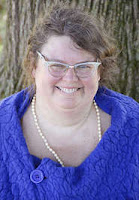Shad, Chocolate, and Gingerbread: Spider in a Tree by Susan Stinson
It’s the summer of 1741. The Rev. Mr. Jonathan Edwards, a fourth-generation
English settler, calls Leah, a woman kidnapped from Africa and currently
enslaved in his household, into his study. Leah comes in carrying a cup of
chocolate and a piece of gingerbread.
They are in Northampton, Massachusetts, where I live now. This is a scene from my novel, Spider in a Tree. Jonathan is recently back from preaching his sermon “Sinners in the Hands of an Angry God” in Connecticut. Leah, who has just been preparing a barrel of shad to be preserved for the winter, is soon to be married to Saul, a man enslaved in the household.
Jonathan has been riding his horse in the woods. As he rode, he pinned notes to his clothes with ideas about a treatise he is working on. He’s writing a defense of slavery in support of another minister, whose congregation has accused him of sin for being a slave-owner. Jonathan’s wife Sarah helps him unpin the notes before he calls for Leah, but slavery is not only being practiced in his home, as it is every day, it’s on his mind.
In Connecticut, people experiencing a religious revival fainted and called out to God in fear for their souls while Jonathan was preaching. This moment back home in Northampton is, like a sermon, also a ritual. Jonathan wants to give Leah counsel and advice before her marriage. Leah, who must put the needs of Jonathan and his family before her own every day, finds this invasive and painful. There is very little room for any of her feelings to be expressed, but she seizes this sliver of an opening to say something true: that she wishes her mother could be with her. The historical Jonathan Edwards wrote rough notes in support of slavery, but he included a critique of the trade itself. He had participated in this trade, so perhaps he had been influenced by the enslaved people who lived with him to think slightly differently about it. In this scene, I am trying to imagine and embody one way that might have happened.
Leah is cleaning shad because this fish, which live most of their lives in the sea, swim up what Native people from the valley would have called the Kwinitekw and settlers the Connecticut River in the spring to spawn. This might be a little late for Leah’s barrel of shad, but the seasons are variable, and people traded up and down the river. I can imagine various circumstances by which she might end up with a barrel of live fish in July instead of June.
Leah brings Jonathan chocolate because he regularly ordered it from Boston. A quick search on the digital archive Jonathan Edwards Online finds references in his account books and letters. Chocolate was part of the Caribbean trade that was based on the labor of enslaved people. In colonial port towns, people milled it into balls or cakes. In a family kitchen, these were shaved into hot water in a chocolate pot, spiced, then whipped so that the shavings melted and there was a foam.
Jonathan’s daughter Jerusha makes Leah gingerbread because
she is trying to be kind. She might have made spice bread, but she knows Leah
doesn’t like allspice. Jerusha doesn’t know why that is. The slave ship that
Leah was trapped on picked up a load of allspice in the Caribbean. The smell
reminds of her of horrors that traumatized her deeply and left her far from
home, enslaved. Making Leah gingerbread on the eve of her wedding is kind, but
that kindness is warped by the fact that she is enslaved, enmeshed in a
hierarchy that Jonathan is both practicing and defending. Leah has been brought
here as commodity, like chocolate and allspice. Concern by her enslavers for
her happiness or for her soul Is rotted at the root until that blight is
addressed. She knows this and struggles to make her life within these
constraints. Jonathan, who has a reputation of being uninterested in food,
insists she eat the gingerbread. The story doesn’t say whether she does or not,
but the spice and sweetness she is being offered are far from a full, free
meal.
Thanks for stopping by to share your food for thought, Susan!
Spider in a Tree: https://smallbeerpress.com/books/2013/10/01/spider-in-a-tree/
Lisa Brooks, Our Beloved Kin: Remapping a New History of King Philip’s War, about the Kwinitekw and the valley in 1675, sixty-six years before this scene: https://ourbelovedkin.com/awikhigan/connecticut-river-valley-1675
Works of Jonathan Edwards Online. Jonathan Edwards Center at
Yale University.
Jonathan Edwards Center at Yale: Jonathan Edwards and Slavery
http://edwards.yale.edu/publication/encyclopedia
Historic Deerfield: Baby It’s Cold Outside: a sweet historic
of chocolate in New England.


No comments:
Post a Comment